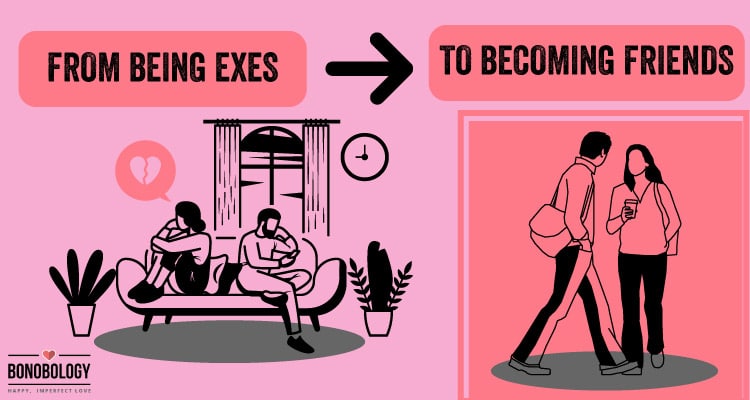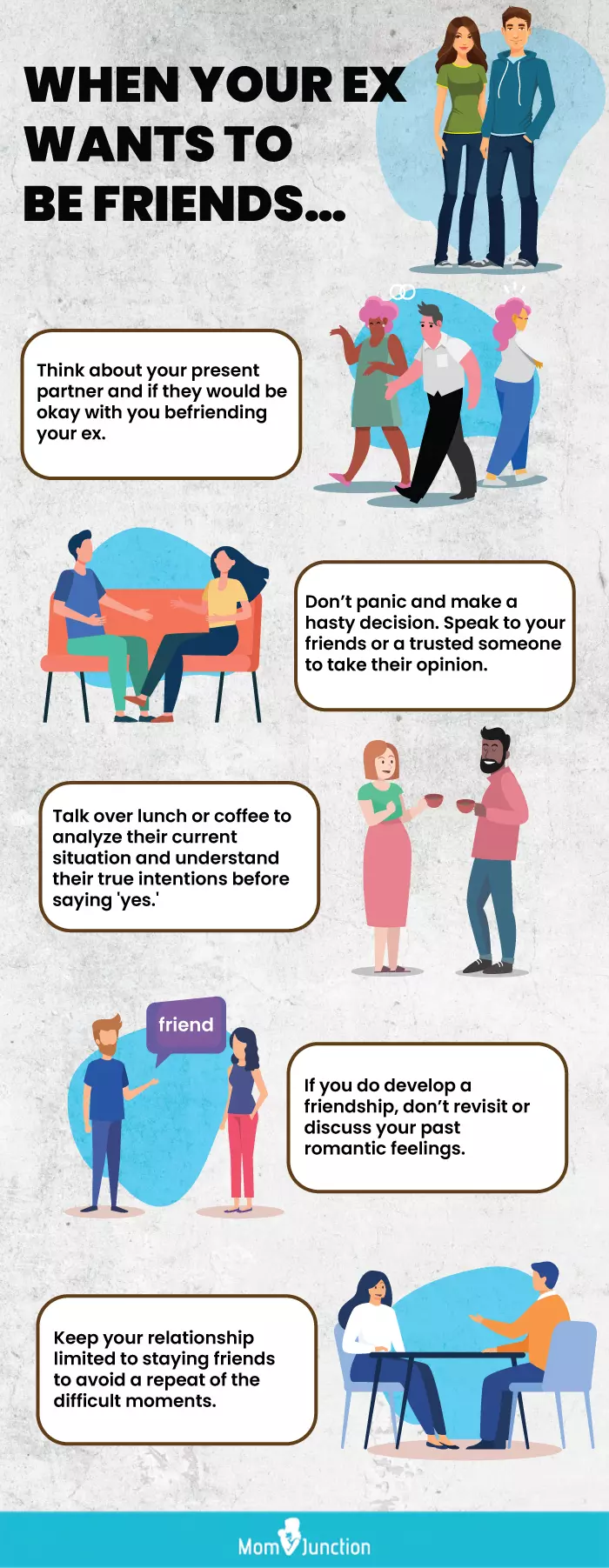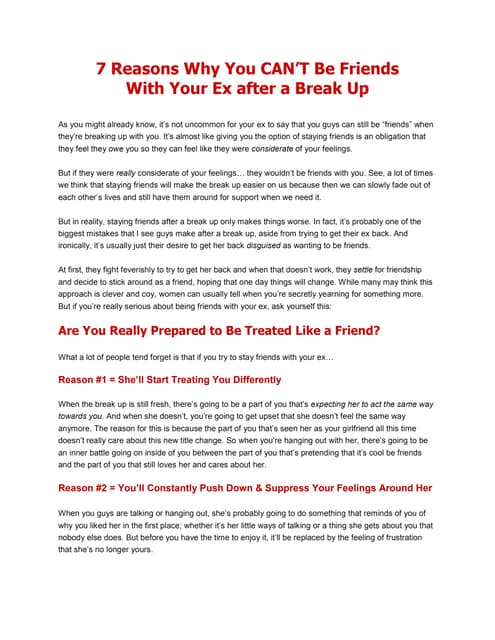
Factors to Consider Before Staying Friends with Your Ex
Emotional readiness
Before diving into a friendship with an ex, both individuals must assess their emotional readiness. It’s essential to evaluate whether any unresolved feelings exist. For instance, Sarah realized she wasn’t truly over her ex while trying to hang out as friends, leading to more heartache.
Communication boundaries
Establishing clear communication boundaries is crucial to prevent misunderstandings. Consider these guidelines:
- Define acceptable topics for discussion.
- Decide how often to meet up.
- Agree on social media interaction.
Setting boundaries ensures that both parties feel comfortable and safe in the friendship.
Mutual respect
Lastly, mutual respect is paramount. A friendship can only thrive when both individuals value each other’s feelings, time, and space. Learning to appreciate the journey you both shared can foster a healthy dynamic. For example, Mark and Jessica maintained their friendship by respecting each other’s new relationships and commitments.

Benefits of Maintaining a Friendship with Your Ex
Shared history and understanding
One of the primary benefits of staying friends with an ex is the shared history and understanding you both possess. Having experienced life together means you can support each other in ways that new friends might not understand. For example, remembering inside jokes or shared adventures can foster a unique bond.
Support system
A friendship with your ex can serve as a valuable support system. They know your strengths and weaknesses and can provide insights that others may lack. Consider:
- Emotional backup during tough times.
- Encouragement for personal goals.
- Understanding without judgment.
This familiarity allows for a deeper level of support that can be hard to find elsewhere.
Increased personal growth
Lastly, maintaining a friendship with an ex can fuel increased personal growth. With insights from each other’s experiences, you can learn valuable lessons about relationships, communication, and self-awareness. For instance, after breaking up, Lisa learned to navigate challenges more effectively by discussing her emotions with her ex. This reflection aids in fostering resilience and maturity in life.

Drawbacks of Remaining Friends with Your Ex
Emotional confusion
Despite its benefits, remaining friends with an ex can lead to significant emotional confusion. For instance, Alex found himself questioning his feelings every time he met up with his ex-girlfriend. This can create an unclear dynamic, making it difficult to move on emotionally.
Jealousy and lingering feelings
Jealousy often rears its head, particularly when either ex begins to date someone new. Feelings might resurface unexpectedly, which can complicate the friendship. Consider the case of Mia, who struggled to process her feelings when she saw her ex with a new partner, leading to unnecessary tension.
Interference with new relationships
Additionally, a friendship with an ex can interfere with new relationships. New partners may feel uncomfortable with the friendship, leading to trust issues. It’s essential to consider how this friendship affects your current romantic life. For example, Ben noticed his girlfriend becoming increasingly jealous of his ongoing friendship with his ex, ultimately straining their relationship. These complications highlight the potential drawbacks of maintaining an ex-relationship as a friendship.

Communication Strategies for a Healthy Friendship with Your Ex
Setting clear boundaries
To ensure a healthy friendship with your ex, start by setting clear boundaries. Discuss what behaviors and topics are off-limits. For instance, Emily and Jake outlined that discussing their romantic past was a no-go, which helped them focus on their present friendship without triggering unwanted emotions.
Honesty and openness
Honesty and openness are vital components in maintaining this friendship. Being able to express feelings without judgment fosters mutual understanding. For example, during a casual coffee chat, Sarah felt comfortable admitting she needed space when seeing her ex started to feel overwhelming. This transparency can strengthen trust between friends.
Respecting each other’s space
Finally, respecting each other’s space is crucial. Allowing time apart nurtures emotional well-being and healthy interaction. Consider scheduling catch-ups ahead of time rather than last-minute plans, so both parties can mentally prepare. Mark and Lily found that giving each other room to breathe led to more enjoyable and meaningful hangouts. By implementing these strategies, ex-partners can navigate the nuanced waters of friendship successfully.

Signs That Staying Friends with Your Ex May Not Be a Good Idea
Unresolved issues
Recognizing when staying friends with an ex might be problematic is crucial. One key sign is unresolved issues. If past conflicts continuously resurface, it signals that emotional baggage isn’t fully addressed. For instance, Nora and Tom often found themselves arguing about their breakup, hindering their ability to foster a genuine friendship.
Persistent conflicts
Another red flag is persistent conflicts. If interactions frequently lead to arguments or misunderstandings, it may indicate a toxic friendship dynamic. For example, Max and Rachel’s conversations often turned into disputes over trivial matters, showcasing an inability to communicate effectively without negativity creeping in.
Lack of positive growth or change
Lastly, if either party shows a lack of positive growth or change, it may be time to reconsider the friendship. Growth is essential for healthy relationships, and stagnation can lead to resentment. When Lisa noticed that her ex had not changed since their breakup, she realized their friendship was holding her back from pursuing new experiences. Recognizing these signs can help individuals make informed decisions about their friendships with ex-partners.

How to Transition from Exes to Friends Successfully
Give yourselves time to heal
Transitioning from exes to friends requires patience, starting with allowing both parties time to heal. Rushing back into a friendship too soon can lead to unresolved emotions resurfacing. For instance, Jenna and Mark took six months apart to process their breakup, which significantly improved their chances of a successful friendship later on.
Focus on building a platonic relationship
Next, focusing on building a platonic relationship is essential. Start engaging in casual activities that don’t carry romantic undertones. Examples include:
- Going for coffee or a walk.
- Participating in group outings with mutual friends.
- Joining a local hobby class together.
This approach helps establish new dynamics without shadowing past romance.
Seek closure and acceptance
Lastly, seeking closure and acceptance is crucial for a successful transition. Discuss feelings openly and acknowledge the reasons for the breakup. For example, when Amy and Ryan finally talked about their different life goals, they both felt a sense of relief and understanding, allowing them to embrace a new chapter of friendship. With these steps, healing and growth can pave the way for a rewarding friendship.

Understanding When It’s Time to Let Go of the Friendship
Continuous emotional turmoil
Knowing when to let go of a friendship with an ex is crucial. Continuous emotional turmoil is a significant indicator that it may be time to part ways. For example, Emma often felt anxious after interacting with her ex, as unresolved feelings kept resurfacing. This cycle of emotions can be draining and unhealthy.
Lack of mutual respect
Another telltale sign is a lack of mutual respect. If conversations regularly devolve into insults or dismissive attitudes, the friendship may not be viable. When Jake realized that his ex frequently belittled him during their chats, he recognized that respect had deteriorated, making it unhealthy to continue the friendship.
Impact on your well-being
Finally, consider the impact on your overall well-being. If staying friends negatively affects your mental and emotional health, it’s time to reevaluate. For instance, Nicole found herself feeling low whenever she spent time with her ex, leading her to prioritize her happiness instead. By recognizing these signs, individuals can make informed choices about their friendships with former partners.

Real-life Experiences: Stories of Successful and Unsuccessful Friendships with Exes
Positive outcomes
Many people find success in maintaining friendships with their exes. For instance, Anna and Brian, who dated in college, ultimately transformed their relationship into a supportive friendship after giving each other space. They now celebrate milestones together and act as each other’s sounding boards for life decisions, demonstrating that healthy boundaries can lead to positive outcomes.
Challenges faced
However, not all transitions are smooth. Take the case of Julia and Adam, whose attempt at friendship quickly became a minefield of unresolved feelings. They consistently found themselves reliving past arguments and experiencing jealousy during each interaction. Their challenges highlighted the complexity of mixing romantic history with friendship dynamics, proving that it’s not always a straightforward journey.
Lessons learned
From these experiences, several lessons emerge:
- Know your limits: Understanding your emotional boundaries is crucial.
- Be honest: Keep communication open about any lingering feelings.
- Prioritize growth: Focus on personal growth before attempting a friendship.
By reflecting on both successful and unsuccessful stories, individuals can navigate their own paths with clearer expectations and intentions.

Conclusion
Summary of pros and cons
In navigating the complexities of friendships with exes, it’s essential to weigh the pros and cons. Benefits include a rich shared history and a robust support system, while drawbacks can range from emotional turmoil to interference in new relationships. Recognizing these factors can guide your decision-making process.
Final thoughts on staying friends with your ex
Ultimately, whether to remain friends with an ex depends on individual circumstances. Prioritize open communication, mutual respect, and personal well-being. For many, fostering a friendship can lead to growth and understanding, while for others, it may be healthiest to part ways. Trust your instincts and remember that it’s okay to choose self-care first.
